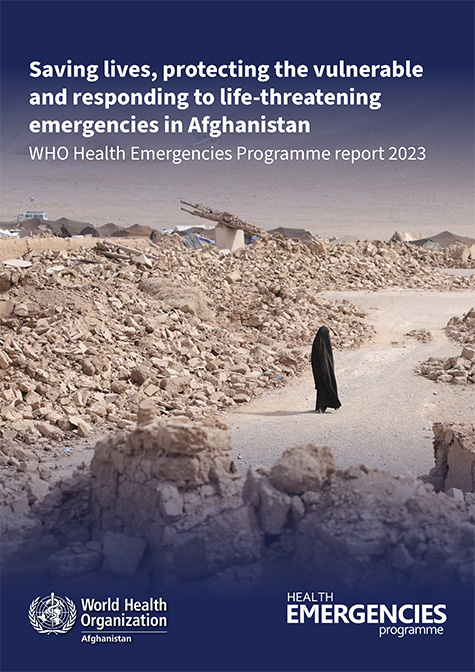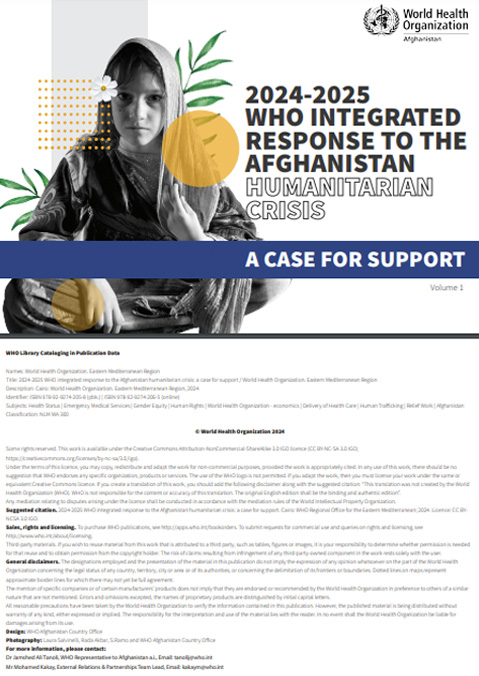23 September 2021 – WHO remains on the ground and is scaling up efforts to continue responding to the escalating health and humanitarian crisis unfolding across Afghanistan.
The country’s already fragile health system is overwhelmed.
The impacts of the pause of funding to the Sehatmandi project are already being felt. WHO is calling on international donors to rapidly re-commit to finance Sehatmandi, as they have done for almost 2 decades.
In recent weeks, access to health care has significantly declined for hundreds of thousands of vulnerable Afghans. There has already been a surge in cases of measles and diarrhoea, almost 50% of children are at risk of malnutrition and a resurgence of polio is a major concern. All elements of the COVID-19 response have declined, and 2.1 million doses of COVID-19 vaccine remain unused. There is an urgent need to ensure that these doses are utilized before they expire.
According to our assessments, only 17% of health facilities supported by Sehatmandi remain fully functional. Two thirds are experiencing stock-out of essential medicines. Without urgent action, they are at risk of closure.
We are coordinating with donors to find an alternate funding mechanism to sustain the health facilities supported by the project to avoid an increase in diseases and deaths. We are also working with partners to find a short-term solution to fund and support 538 priority facilities of Sehatmandi so that life-saving health care can continue.
As of 23 September, Afghanistan has reported 154 929 cases of COVID-19 and 7194 deaths. Due to interruptions to COVID-19 surveillance and a significant decline in testing because of the recent insecurity, we know there is an underreporting of cases.
WHO is boosting the COVID-19 testing capacity in the country. Recently, we have airlifted 50 000 COVID-19 tests that are currently being distributed to 32 laboratories across the country. Some 150 000 more COVID-19 tests are in the pipeline and will be delivered in the next 3-9 months. WHO has recently established a new testing site in Nimroz province and 10 more laboratories are planned in different provinces.
With only one case of wild poliovirus reported so far this year, compared to 56 in 2020, we have an extraordinary opportunity to eradicate polio. Together with partners, WHO is ready to implement a door-to-door polio vaccination campaign across the country. Given that the measles outbreaks are also spreading, the polio programme plans to deliver an integrated campaign, including measles and COVID-19 vaccination.
Escalating health needs are continuing to strain health facilities, which remain short on essential supplies. WHO’s operation and logistics team is working round the clock to deliver supplies across Afghanistan to fill these shortages. WHO was the first humanitarian agency to deliver medicines and medical supplies in August 2021 after disruptions to the Kabul airport. Since then, we have airlifted more than 170 metric tonnes of life-saving supplies and are exploring options to expedite further shipments into the country.
We are continuing support for 130 trauma care facilities and 67 blood banks and plan to resume capacity-building training for health staff.
The health of women and children of this country will depend on the availability of female doctors, nurses and midwives. We call for a safe and productive work environment for female health workers, and for their ongoing education and training.
I reaffirm WHO’s support to Afghanistan and that we will continue delivering a coordinated health response through more than 50 partners.
Related link
Statement by WHO Regional Director at WHO press briefing on Afghanistan and Lebanon













